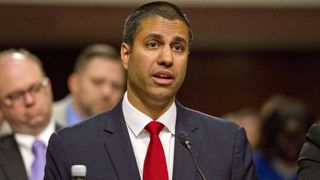Media Regulations Revamp Draws a Crowd

FCC Chairman Ajit Pai has promised a monthly dose of media-related rule revamps as he employs the regulatory Weedwacker on that sector, and he has a lot of industry prescriptions to choose from.
The chairman has signaled that looking at all media regulations is only fair, since the FCC has long had to review telecom regs and media-ownership rules, but not more generally the various regulations applying overall to media — some of which are decades old and were forged in an analog world.
Pai’s initial forays earlier this month were to propose getting rid of the rules that required some TV stations and cable operators to keep paper copies of FCC rules, and to update cable signal testing and proof-of-performance rules for a digital era when signal quality and pictures are superior to analog.
But those were clearly the low-hanging fruit. Cable operators and broadcasters have some other targets they’d like to see in Pai’s sights.
Recrafting Program Carriage
Cable operators, represented by NCTA–The Internet& Television Association, have asked the FCC to modify the program carriage rules, arguing that cable operators no longer own a significant percentage of the hundreds of networks they carry. Besides, NCTA says, the video marketplace is booming.
The FCC may be receptive to that argument if it concludes, via its next video competition report, that over-the-top is a legitimate competitor. And Pai has certainly signaled that is his view of the digital world.
Broadcasting & Cable Newsletter
The smarter way to stay on top of broadcasting and cable industry. Sign up below
“As courts have recognized, the prevalence of vibrant competition among video programmers and among distributors of video programming has diminished the ability and incentive of cable operators and other MVPDs to engage in — and networks to demonstrate — the sorts of unfair, anticompetitive conduct at which Section 616 [the program carriage rules] was aimed,” NCTA said.
Sorry, Wrong Number
The Radio-Television Digital News Association and the National Association of Broadcasters want the FCC to lift the Telephone Broadcast Rule. The rule seems pretty straightforward — it requires that before broadcasters can record a phone conversation for broadcast at a later date, “a licensee must inform any party to the call of its intention to broadcast the conversation, except where such party is aware, or may be presumed to be aware from the circumstances of the conversation, that it is being or likely will be broadcast.”
While it sounds on its face like a reasonable privacy protection, broadcasters point out that it only applies to them. A broadcast-only rule in the interests of protecting privacy is nonsensical, the RTDNA argues, given that there are “so many pervasive means through which a recorded telephone conversation may be disseminated for public consumption.”
The news association also pointed out that federal wiretapping statutes, state restrictions and tort law all take care of privacy issues, as is the case with print and digital news outlets.
The rule, they argue, simply serves to restrict how broadcast reporters conduct interviews with public officials and newsmakers and impairs their ability to do investigative journalism.
Second Look at Leased Access
The American Cable Association and NCTA want the FCC to rethink leased-access rules, which require MVPDs to make a set amount of channel space available to public and local governments, and mandates they incur “unrecoverable costs” in providing it.
The ACA told the FCC that given the rise of the internet and social media, leased access has outlived its charter of promoting the widest possible diversity of video.
ACA and NCTA want the FCC to give them the flexibility to respond to only “bona fide” requests for leased access channels, and let them get some earnest money up front in the form of a deposit or application fee, the ACA said.
The FCC last week confirmed that the media regulation revamp items teed up for the September meeting are ones that it has said will reduce paperwork for broadcasters and cable operators, while also updating cable signal testing for a digital world. That’s September; after that, all bets are off.
Contributing editor John Eggerton has been an editor and/or writer on media regulation, legislation and policy for over four decades, including covering the FCC, FTC, Congress, the major media trade associations, and the federal courts. In addition to Multichannel News and Broadcasting + Cable, his work has appeared in Radio World, TV Technology, TV Fax, This Week in Consumer Electronics, Variety and the Encyclopedia Britannica.

